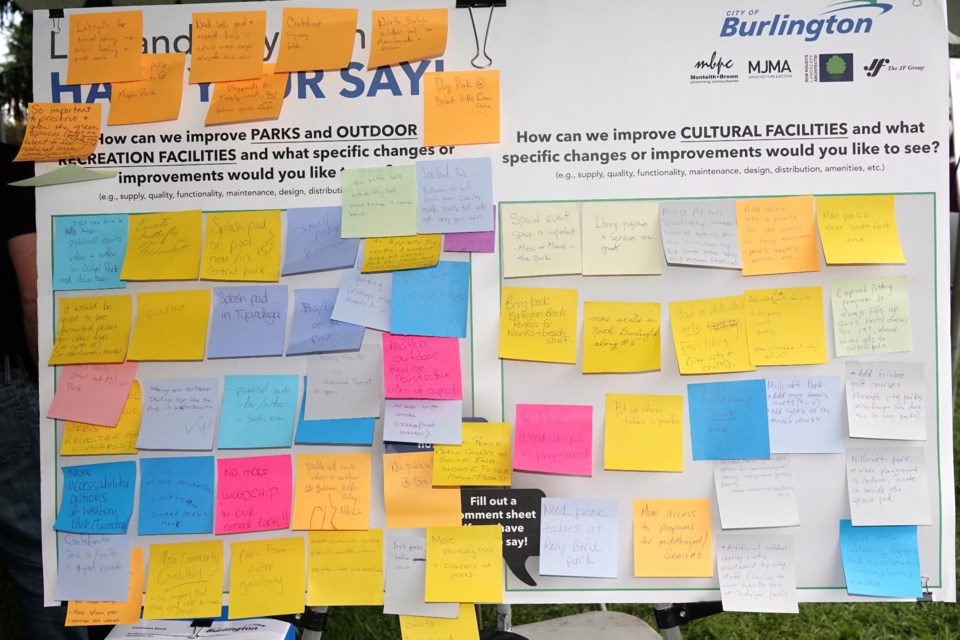
As Burlington prepares its 2026 budget with a proposed 4.49 per cent property tax increase, city officials are using community events like town halls and the popular “Food for Feedback” program to get residents more involved in shaping local policy. According to a freedom of information request, the city paid over $44,212 to host this year’s FFF event to cover costs like photographers, environmental services, party rentals, translation services, and marketing, with the biggest cost being the food trucks themselves.
“I’m absolutely fine with the city paying such sums for events like this,” said Bilal Al Balhwan, who has attended the last two FFF events. “As long as they are there to actually listen, and I am able to see a response to my concerns, I’m pretty OK with my tax dollars being spent on such events.”
Noticing low engagement numbers and municipal voter turnout rates dropping, the city launched FFF in 2019, an annual event where residents who come out to provide feedback and their thoughts on policies are offered a meal from the food trucks present.
The 2026 budget will be presented to city council on Nov. 3 and includes a proposed 5.80 per cent increase in the city’s budget, which will result in an overall property tax increase for residents of 4.49 per cent. This hike is the lowest in the last three years.
At the 2025 FFF event, over 2,000 residents showed up, according to event planners, including Al Balhwan, who called the FFF “a really smart idea.”
“I don’t know the exact numbers that come to it, but all the ministry tables and councillors have lines of people waiting to speak to them. And then you get lunch for the day.”
Coun. Angelo Bentivegna, responsible for one of the largest wards in terms of population, said of the event, “We needed to be innovative, and people like to eat.” Bentivegna said he runs almost 50 drop-ins a year to engage citizens in the process of budget development and deployment.
Since the release of the financial forecast report in July, Burlington has hosted six in-person town halls (one in each ward), multiple online surveys, and dozens of drop-ins with ward councillors.
“I would like to see more people turn up to these town halls. However, I get the most people who come in during my drop-ins,” said Bentivegna. “I ask people to tell me what they think we should do better, what we need and don’t need, and we take it from there. That is the best way to attack budgets.”
Following the drop-ins, Bentivegna works closely with his office and authorities to compile a report including research, statistics, and recommendations that are shared with the residents with regards to the discussed issues.
“Each resident comes in with a different topic, and we want to be part of the solution,” Bentivegna said, describing e-bikes and neighbourhood safety as top concerns in his ward.
City-run community events can have an indirect influence on policy decisions, according to Duncan MacLellan, a Toronto Metropolitan University politics and public administration professor, but he says that depends on the nature of the event.
“For example, a community event that focuses on reducing poverty, within certain marginalized communities, can bring attention to this issue and give it a higher profile amongst the public and councillors,” MacLellan said.
However, the consistent challenge is getting civilians out to attend the community events, Bentivegna said. “I know there is criticism for people saying, ‘they’re there, but do they really listen?’ … we actually do.”
The city posts about the events online to highlight the importance of providing feedback to policymakers, Bentivegna said.
“Success, in terms of fostering genuine civic participation, rests on ensuring organizers are able to educate participants on the importance of the event,” MacLellan said. “This means communicating information as to why participants should get involved, especially if participants have a personal stake in the issue.”
In 2023, the city received the Granicus Digital Government Award for the FFF event, and residents often share the date across Facebook groups, city Subreddits, and group chats, encouraging others to come out.
Bentivegna says that without the public’s input on policies, it is hard to understand if the right steps are being taken by the city.
“By keeping residents informed, I hope that they will be more interested in their civic duty,” said Bentivegna. “The only way to come out is by understanding what happens, and that they can make a difference.”
No AI was used in the production of this piece.
